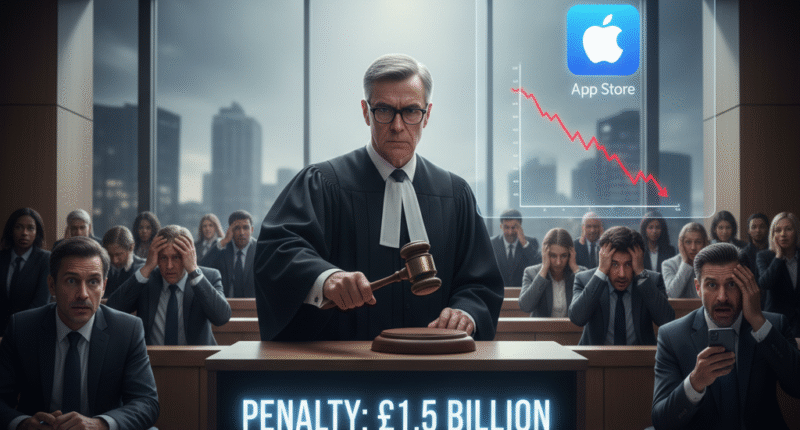Apple Faces £1.5 Billion Payout After Court Rulin—Impact on Market Sentiment
Apple, the world’s most valuable technology company, has been hit with a landmark court ruling in the UK. The judgment centers on its controversial App Store practices, ordering Apple to pay approximately £1.5 billion in damages after it was found to have abused its market dominance. This seismic event promises not only compensation for consumers but could also shift the landscape of app marketplaces and investor confidence globally[64][65][70].
Understanding the Court Ruling Against Apple
The UK Competition Appeal Tribunal (CAT) concluded that Apple unlawfully overcharged as many as 36 million iPhone and iPad users over the last decade. The central issue: Apple’s 30% commission fee on app sales and in-app purchases, which the court described as “excessive and unfair.” The case, led by Dr. Rachael Kent, marks the first successful class action of its kind in the UK, highlighting how Apple’s payment system excluded competition and inflated prices for both consumers and developers.
According to tribunal findings, Apple’s restrictions were not necessary or proportionate for platform safety or integration, as claimed. Instead, true competition would have delivered better value and choices to consumers—directly challenging Apple’s core business model[65][68].
Immediate Financial and Market Repercussions
Apple has stated it will appeal, but the prospect of a £1.5 billion payout remains. The company’s shares showed mixed momentum post-ruling, reflecting investor uncertainty. While Apple’s immense cash reserves mean it can absorb the cost, the reputational damage and potential for further legal actions in other markets weigh on investor sentiment.
– **Short-term market impact**: Apple’s stock may experience volatility as analysts recalculate risk, but consensus views the payout as a manageable expense for Apple’s financial scale.
– **Broader implications**: Regulatory scrutiny on app store fees is intensifying worldwide. The CAT ruling adds fuel to ongoing investigations and lawsuits against Apple in the US, EU, and other regions. Developers and users may expect fairer fees and more payment options in the future[71][69].
Investor Sentiment and Market Outlook
For investors, the legal setback is both a warning and an opportunity:
– **Regulatory risk**: Apple now faces stricter oversight in the UK and potentially other jurisdictions. Its dependence on App Store commission revenue could be challenged further.
– **Innovation and adaptation**: Apple’s ability to diversify into new tech sectors (e.g., generative AI, privacy-focused services) and restructure its monetization approaches will be critical for long-term resilience.
– **Global trend**: The case is part of a wider crackdown on Big Tech’s market dominance. As regulations tighten, all major tech platforms may have to adapt their business practices to remain competitive and avoid similar penalties[67][72].
What Does This Mean for Consumers and Developers?
Consumers who made app purchases on iPhones or iPads in the UK since October 2015 may be eligible for compensation. For app developers, the ruling could catalyze new opportunities to offer alternative payment systems and reduce reliance on Apple’s strict terms—spurring innovation, competition, and better pricing across digital marketplaces[64][70].
Conclusion: Navigating Apple’s New Reality
The £1.5 billion court ruling against Apple is a major milestone in the campaign for fair digital marketplaces. For Apple, managing the financial, legal, and reputational fallout will test its resilience and creativity. For investors and consumers, the outcome signals a more competitive tech ecosystem, where dominant players are held to account and innovation is better rewarded.












12 comments
Thank u
Thanks 🌼
Oh No!😥
Regulatory overseeing is more rigid and costly on big name in tech field. It’s unbelievable. Hopefully apple can show its resilience.
Unbelievable.Why only Apple facing this?
Omm🙃
😯😯🙄🙄
🥰🥰
🍀
Good news
Thank